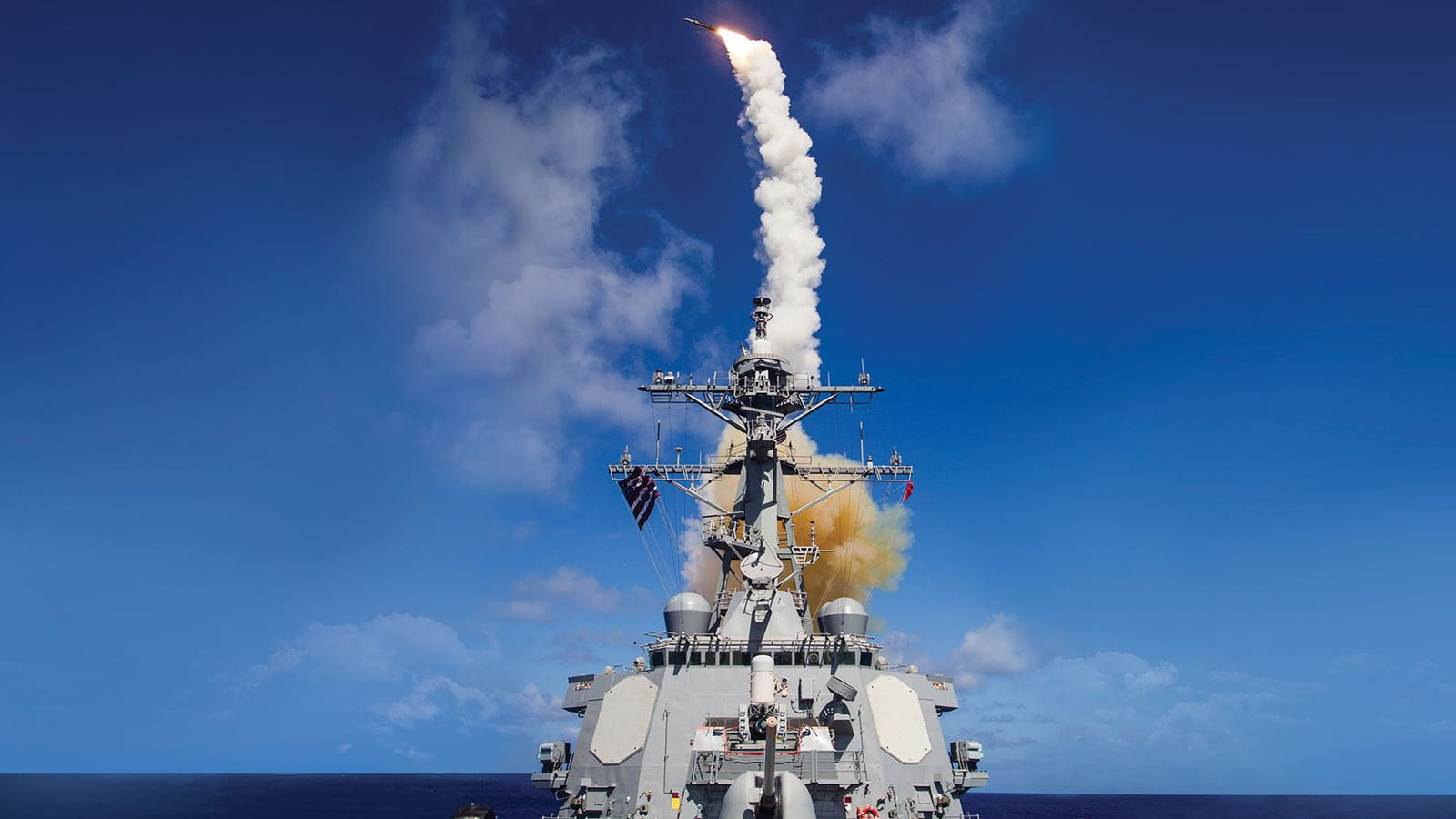It's going to be a busy year for United Technologies (UTX +1.05%) and Raytheon (RTN +0.00%). First, United Technologies will spin off its elevator business, Otis, and, separately, its heating, ventilation, and air conditioning business, Carrier. Second, the remaining aviation business of United Technologies (namely Pratt & Whitney and Collins Aerospace) will be merged with Raytheon in order to create a new company called Raytheon Technologies with a new ticker, RTX. Let's take a look at what the new company could look like and try to piece together whether it makes sense to buy the stock.

A Raytheon missile firing. Image source: Raytheon website.
Raytheon or United Technologies?
We already know that the newly created company, Raytheon Technologies, will be 57% owned by United Technologies (UTC) shareholders and 43% by Raytheon. Therefore, the key difference in deciding whether to buy Raytheon or UTC stock comes down to the fact that if you buy Raytheon stock, you will end up owning 43% of Raytheon Technologies.
On the other hand, if you buy UTC stock, you will end up owning 57% of Raytheon Technologies plus Carrier and Otis stock. While the latter are attractive businesses in their own rights, it's clear that its UTC's aerospace businesses that have been outperforming lately, and investors interested in Raytheon Technologies are likely to be more focused on aviation and defense and therefore to favor Raytheon as the way to get exposure.
Valuing Raytheon Technologies
Following Raytheon is also a good idea in terms of trying to gauge how the market is feeling about the new company. Assuming the market is now pricing Raytheon as being, de facto, a 43% stake in the new company, Raytheon's current market cap of $60.7 billion implies the market thinks Raytheon Technologies is worth around $141.1 billion.
The new company is set to start with $26 billion of net debt ($24 from UTC and $2 billion from Raytheon), which implies the enterprise value (market cap plus net debt), or EV, of the new company is being set at $167.2 billion.
Estimated earnings for United Technologies and Raytheon
Now it's time to take a look at what the earnings of the new company could be and then see if the $167.2 billion valuation makes it a good value. Digging into UTC's filings at the Securities and Exchange Commission (SEC), here's a summation of analysts' forecast in the S-4 form filed in connection with the merger. (For reference, EBITDA is earnings before interest, tax, depreciation and amortization.)
As you can see below, Raytheon Technologies is expected to grow EBITDA in the mid to high single digits in the next few years.

Data source: United Technologies SEC filings.
Taking these figures for EBITDA and then applying the implied EV of $167.2 billion gives the following EV/EBITDA and EV/EBIT multiples for the new company.
|
Raytheon Technologies |
2019 |
2020 |
2021 |
2022 |
2023 |
|---|---|---|---|---|---|
|
EBITDA |
$13.7 billion |
$15.0 billion |
$16.3 billion |
$17.1 billion |
$17.9 billion |
|
EV/EBITDA multiple |
12.2 |
11.1 |
10.3 |
9.8 |
9.3 |
|
EBIT |
$10.2 billion |
$11.4 billion |
$12.6 billion |
$13.3 billion |
$14.0 billion |
|
EV/EBIT multiple |
16.3 |
14.7 |
13.3 |
12.6 |
11.9 |
Frankly, these implied valuations make the stock look attractive. For example, here's a look at EV/EBITDA and EV/EBIT multiples across the sector. For reference, the new company will generate around 54% of its sales from defense (primarily Raytheon's missile, intelligence, and defense systems and UTC's mission systems) and 46% from commercial aviation (primarily UTC's Pratt & Whitney and Collins Aerospace).
Defense companies, such as Lockheed Martin, Northrop Grumman, and General Dynamics tend to trade on 13 times EBITDA and 16 times EBIT, while commercial aviation-focused companies like TransDigm and France's Safran tend to trade on higher multiples. A more balanced defense/commercial aviation company like Curtiss-Wright is also a useful stock to compare with.
CW EV to EBITDA (Forward) data by YCharts.
Based on the data above, target valuations of an EV equivalent to 13 times forward EBITDA and 15 times current EBIT look reasonable. As you can see, the implied valuation for Raytheon Technologies suggests buying Raytheon stock is a good idea. For example, a forward multiple of 13 times 2020 EBITDA gives an EV of around $195 billion, and stripping out the $26 billion in net debt gives a market cap of $169 billion -- some 20% above the theoretical market cap (calculated above using Raytheon's current market cap) of $141.1 billion.
Raytheon and United Technologies are good values
Frankly, both Raytheon and United Technologies look like good values, but the lack of exposure to Carrier and Otis probably makes Raytheon the preferred route to get a piece of what might be the most exciting merger to take place in 2020. Moreover, United Technologies has a pretty good track record of integrating acquisitions, with the company exceeding its cost-savings targets for the Goodrich and Rockwell Collins deals. All told, Raytheon is an attractive stock for 2020.












